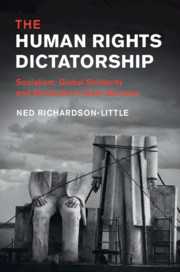Book contents
- The Human Rights Dictatorship
- Human Rights in History
- The Human Rights Dictatorship
- Copyright page
- Dedication
- Contents
- Acknowledgements
- Abbreviations
- Introduction
- 1 Creating a Human Rights Dictatorship, 1945–1956
- 2 Inventing Socialist Human Rights, 1953–1966
- 3 Socialist Human Rights on the World Stage, 1966–1978
- 4 The Ambiguity of Human Rights from Below, 1968–1982
- 5 The Rise of Dissent and the Collapse of Socialist Human Rights, 1980–1989
- 6 Revolutions Won and Lost, 1989–1990
- Conclusion
- Archival Sources
- Index
5 - The Rise of Dissent and the Collapse of Socialist Human Rights, 1980–1989
Published online by Cambridge University Press: 06 April 2020
- The Human Rights Dictatorship
- Human Rights in History
- The Human Rights Dictatorship
- Copyright page
- Dedication
- Contents
- Acknowledgements
- Abbreviations
- Introduction
- 1 Creating a Human Rights Dictatorship, 1945–1956
- 2 Inventing Socialist Human Rights, 1953–1966
- 3 Socialist Human Rights on the World Stage, 1966–1978
- 4 The Ambiguity of Human Rights from Below, 1968–1982
- 5 The Rise of Dissent and the Collapse of Socialist Human Rights, 1980–1989
- 6 Revolutions Won and Lost, 1989–1990
- Conclusion
- Archival Sources
- Index
Summary
In the 1980s, many disillusioned East Germans dropped out of the official social system and created a parallel civil society within the Protestant Church, striving towards disarmament, demilitarisation and environmentalism. While these activists sought to eschew politics, the SED’s repression of a social sphere outside of party-approved organisations demonstrated to many that political reform was imperative to achieving even purely moral goals such as peace. In 1986, a small group of activists created the Initiative for Peace and Human Rights, sparking a rallying cry for disparate groups of disaffected East Germans, who invoked human rights not as the antithesis of socialism but as a core value forgotten and abused by the SED. Simultaneously, the SED’s ideological bulwark against such a movement began to crumble as it sought to create a socialist version of the Universal Declaration of Human Rights. Despite initial enthusiasm from allies who saw it as a means to unify the socialist world against Western pressure, one country after another pulled out, scared off by various human rights guarantees contained within. Simultaneously, reformers began to see human rights as a rhetorical tool to liberalise sclerotic political institutions to save the socialist project as a whole.
Keywords
- Type
- Chapter
- Information
- The Human Rights DictatorshipSocialism, Global Solidarity and Revolution in East Germany, pp. 180 - 221Publisher: Cambridge University PressPrint publication year: 2020

